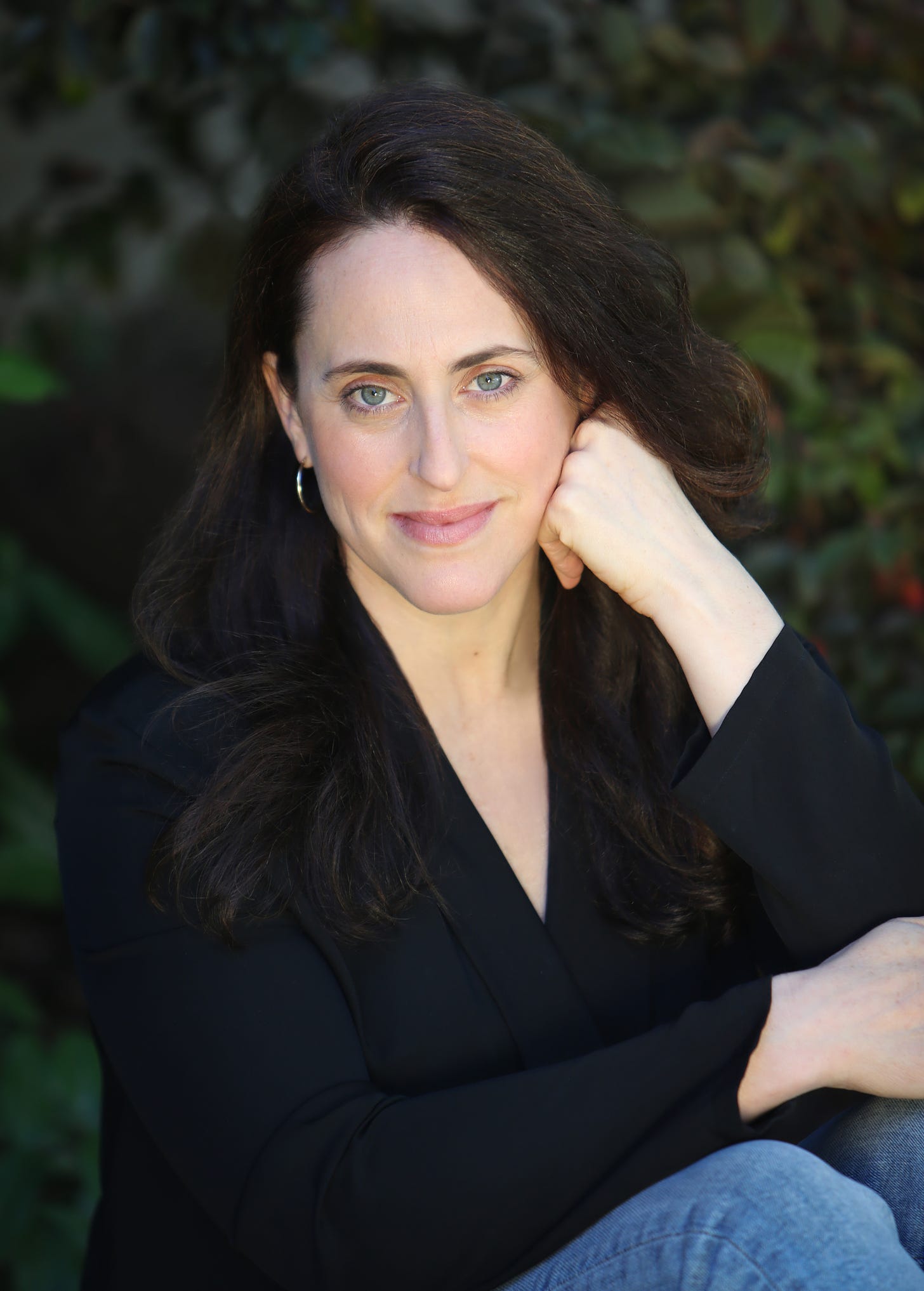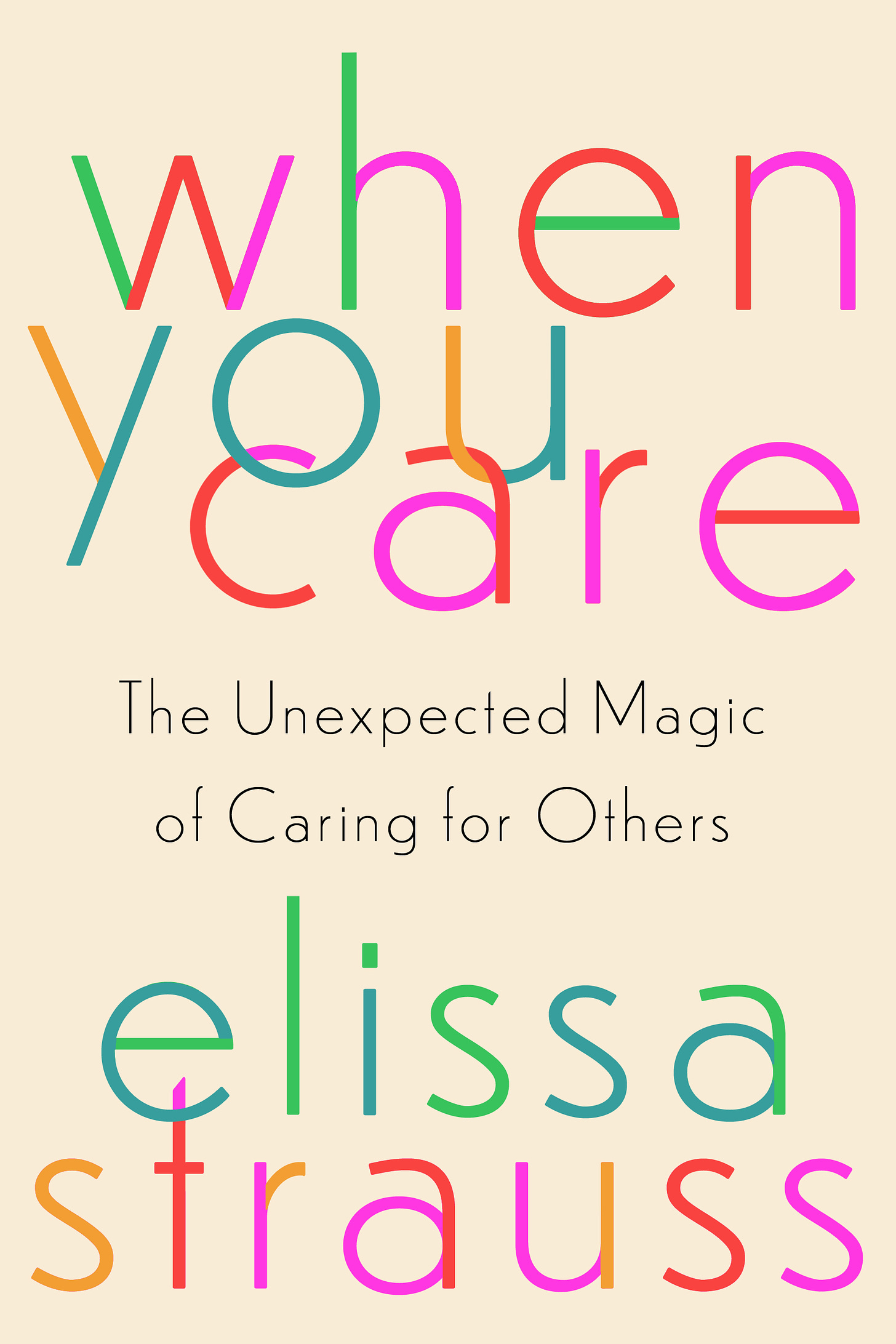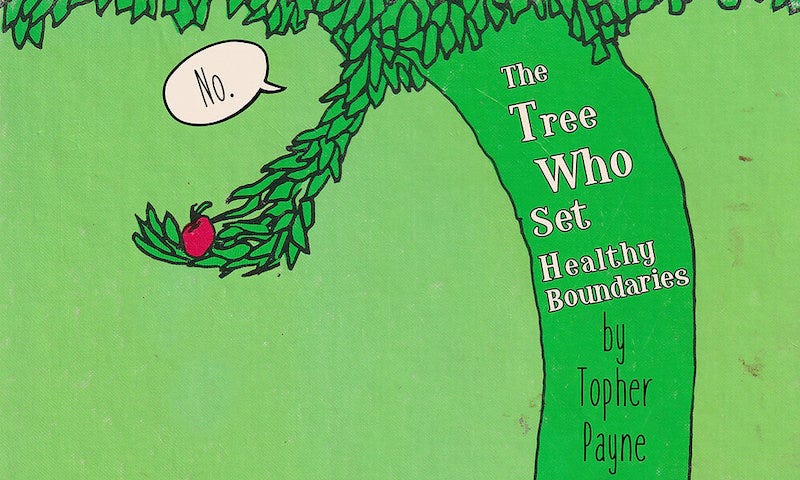Mother's Day Extra: Elissa Strauss On The Ethics, Economics and Heroics of Care
When You Care is a book about putting the right value on something priceless
Hello friends. Happy Mother’s Day if you celebrate, if you roll your eyes at the concept, if it’s complicated for you because of your own family relationships, if you love brunch, if you hate brunch, if you just want to be by yourself today and take a bath. For all of the above, this newsletter is for you.
I’ve read Elissa Strauss’ work for a long time. She is a candid, deft and prolific writer who is funny and feminist. I was so excited to see her new book, When You Care, which is about the politics, policies and economics of caregiving, especially motherhood, but also about the delights and the challenges and the opportunities for intellectual and spiritual growth.
Here are some excerpts from our conversation.
Maybe we can start by asking about what first drew you to this topic.
This book really came from like 2 parallel places, and almost like contradictory places.
One is that I had written about feminism and motherhood for a long time. I felt like I reached this point where I could not write one more article about paid leave, or the need for universal, affordable childcare or healthcare for pregnant women, or elder care? Not that others should not be writing about those things, but I was like, how many times can I say this?
So it made me interested in the cultural roots of the care crisis.
And then the other thing that happened is that when I became a mom and I was excited to become a mom, but I still had this real sense that, like selfhood and motherhood were a zero-sum game.
You know that Doris Lessing quote :“There is nothing more boring for an intelligent woman than to spend endless amounts of time with small children.” [Lessing, the Nobel Prize-winning novelist, famously left her first marriage and two small children in Zimbabwe, then Rhodesia, and went to live in London].
I internalized that, and so the big Aha! thing for me was not just that I loved my kid, but that parenting also would be deeply, spiritually, psychologically, philosophically, challenging, in a way that I was like, Wait, why are we all so worried about erecting these kind of boundaries between our thinking and creative selves and our maternal selves?
It's tricky, right? Because the valorization of care certainly seems to belong to the other side politically. So how do you walk that line of lifting up the intrinsic value of care, while also insisting that it have a dollar value as well?
So for me, one way is trying to decouple care from the patriarchy. Just doing that imagination work to even try to think like, what would it look like if we were a society that really valued care and caregivers? But it wasn't seen as exclusively women's work, and it wasn't either romanticized or diminished.
And then the other way is to really think about in material terms, how is this holding us back economically?
In the world of climate and ecology which I'm somewhat in, there's a similar dilemma. There's there's one side that's like, let's quantify ecosystem services—the things that nature brings us—and also the job opportunities in the clean economy, and the other side is like, no, this is unquantifiable. This is of inherent value.
I'll quote Nancy Folbre, who's a feminist economist, and you know her great line is: we already put a number value on care, and it's a big, fat 0. Maybe one day we will move to a different way of being in this world, a post capitalist society. But we live in these economic structures now, and caregivers are really materially suffering as a result.
Say you're in conversation with someone who's younger, who's thinking about having kids. What do you say about the benefits?
Anecdotally, and in my personal experience, I did all the things that one does to try to find themselves. Meditation retreats and long hikes and backpacking trips. And those are like really powerful meaning making experiences, and will continue to be for me in my life. But nothing for me held up the clearest mirror to myself as raising kids.
I was truly, in a way, closer to another human mind than I had ever been, especially in the pre verbal era. It was up to me to anticipate needs, predict needs, try to satisfy needs that were weren't clearly articulated. It took a level of seeing the other that then trickled down into the rest of my life.
It's interesting because I am always wary of saying having children makes you better. Clearly, there's a lot of terrible people that have children.
Absolutely.
I would say that it's like, it's a chance to get better.
I dig into that my philosophy chapter. We hear these plausible stories of these ethical conversions by way of care. Like Meghan McCain [the Republican talk show host who came out for paid parental leave after having her own child].
And I buy the premise of some of these groups —-women's peace groups, mothers’ environmental groups. But of course, also there's the world still also with crappy parents, crappy caregivers of all stripes.
So what does it take to turn what you experience in that act of care into something bigger? I found an intellectual framework for that in the world of care ethics.
It started with a psychologist named Carol Gilligan.
Lawrence Kohlberg at Harvard was looking at the ethical formation of people. And he found that women are are stunted in their ethical formation, that they get stuck in this relational phase, where men can reach much higher rings of, you know ethical thought, like having kind of a universal ethic.
So Gilligan ended up doing her own research and discovering that the relational ethic wasn’t lesser than any other system.
Maybe you have a rules-based ethic, like the Ten Commandments say “do not bear false witness.” Or you have a virtue-based ethic, like I am honest, therefore I will not tell a lie. And a relational ethic is: I put my relationship first. I have this best friend and maybe her dad just died, and maybe she cheated off me, but I won’t go to the teacher. It’s abot privileging caring in the moment for that person.
Gilligan was very careful to say—that's not something that women have, like, in our DNA. It's just generally how women are raised compared to men and boys.
And so from there a world of philosophy grew out of it that for the first time took seriously questions like: What does it mean to give good care? How do we balance our relationship to one person with our relationship to the world more broadly?
In The Golden Hour I write about climate change, and many groups are forming like you mentioned— Parents, and mostly mothers, who are connecting together on the issue of climate change. First, I want to ask if, personally, your experience of parenting has changed your relationship to that set of facts.
Yeah. Absolutely. You have a real stake in the future. It’s your flesh. You have wiped the butt of this person who's gonna be bearing the consequences of whatever's up ahead.
And trying not to fully fall into defeat as a mindset about it. And to pursue those places where I can find hope. And let that also extend to like everyone else's kids.
I wonder if for for anyone that you spoke with, or anyone that you have talked about the book with, whether we can extend an ethic of care like even to non human beings?
A lot of people who write about care that have made the comparison between viewing caregivers as an infinite resource that we can keep taking and taking from, and it'll never collapse, and the environment. The earth cannot keep giving, and caregiver care can't keep magically replenishing, without investment.
And we realize it is relational. We are in a relationship with the earth. It is a mutual dependency relationship. It goes back to creation myths of so many traditions.
But it was something that was very easy to turn a blind eye to with industrialization. And the further we got from the natural rhythms of life, the easier it was to delude ourselves that we didn't have to invest in care. And we didn't have to protect the environment.
Keep reading with a 7-day free trial
Subscribe to The Golden Hour: climate, children, mental health to keep reading this post and get 7 days of free access to the full post archives.







